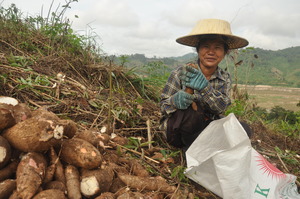GRAIN media release | 14 June 2016
In a newly published dataset, GRAIN documents nearly 500 cases of land grabbing around the world
In 2015, the planet reached “alarming” and “unprecedented” rates of climate change, according to the United Nations—and 2016 is set to be another record-breaking year. Severe droughts, for example, triggered devastating food and water shortages in India, the Pacific and Eastern and Southern Africa. But another factor, notes the organisation GRAIN, is amplifying both climate change and its impacts: the persistent and deepening scourge of land grabbing.
Building on 2008 research that helped put land grabbing in the global spotlight, GRAIN’s new dataset documents nearly 500 current land grab deals across the globe. The cases span 78 countries, around US$94 billion in farmland investments and over 30 million hectares (an area roughly the size of Finland).
Some of the most egregious “mega-deals”, which appeared in the investment frenzy following the 2008 food and financial crisis, have since reduced their ambitions or collapsed altogether. For instance, the assassination of Libyan leader Mouamar Gaddafi put an end to that country's 100,000-hectare rice project in Mali. These failed deals are not necessarily cause for celebration regarding the global land grab phenomenon, however, since the remaining deals tend to embody “hard-core initiatives to expand the frontiers of industrial agriculture”.
These hard-core deals typically have access to financing, boast support from local or government officials and are in it for the long haul. As a result, they can be much more intractable. Much of the Asian-led oil palm expansion into Africa falls into this category, as does the entry of pension funds and trade conglomerates into farmland investing.
In most cases, these land grabs are also water grabs—granting foreign companies access to local communities’ main water sources. These water grabs are occurring in regions of both water abundance and scarcity. As GRAIN’s Ange David Baimey notes, “A frightening number of water guzzling land grabs are occurring in areas with already-intense water conflicts or upstream from water-dependent communities such as the Lurio River project in Mozambique”.
As these deals intensify conflict, violent repression ensues. Land rights activists are detained and imprisoned; journalists are harassed with libel cases and even killed; and peasant and indigenous leaders are routinely murdered.
What’s more, many of these deals are increasingly repackaged as “responsible investments”, as companies and investors become wise to the new (and almost entirely voluntary) guidelines around land acquisition, as well as invent some of their own. This “due diligence”, however, is rarely more than a façade.
If there is cause for optimism, it is in the tremendous surge over the past several years in global resistance, local mobilisation and international solidarity around land grabbing. Farmers, workers, migrant groups, fisherfolk, indigenous peoples, pastoralists and others are converging to address the problem on multiple fronts, while developing creative new resistance strategies. This new dataset and report are intended as resources to contribute to these struggles, which are critical to the future of humanity and the planet.
The report and dataset are available at: https://www.grain.org/e/5492
Contacts:
Ange David Baimey, Accra (French, English)
Email: [email protected]
Tel: +233 269 08 94 32
Devlin Kuyek, Montreal (English, French)
Email: [email protected]
Tel: +1 514 571 7702
Kartini Samon, Jakarta (English)
Email: [email protected]
Tel: +628 131 476 1305
Carlos Vicente, Buenos Aires (Spanish)
Email: [email protected]
Tel: +54 220 4774581, 011 15 63088809
